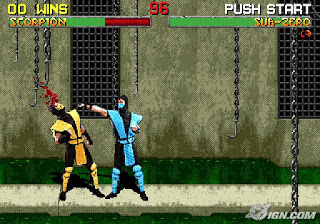In Defence of Mortal Kombat
Like O.J.'s defence council you may think
I'm onto a losing battle here. If not, let me help you arrive at that
conclusion. I am not only going to argue that Mortal Kombat
is good, but that the sequel is better.
Ever since the Megadrive version of
Mortal Kombat 2 beat my imagination into a swirling daze then
roundly finished it with a cheeky spine removal, I have been
convinced the Mortal Kombat games would make for utterly
astounding genre cinema. The universe in which these games are set
features elements that have proven extremely popular over the years,
elements such as marital arts, large scale fantasy, the supernatural,
brain splattering violence, and an Eastern flavour. A Mortal Kombat
movie with a budget and a skilled director behind the lens could be
The Lord of the Rings meets Ong Bak meets Big
Trouble in Little China meets The Evil Dead. Or, put
another way, piss-your-pants awesome.
Which brings us to Mortal Kombat
(Paul WS Anderson, 1995), pretty much the opposite of everything I
described above. Here the Mortal Kombat universe is not treated
with any integrity nor is there really any attempt to make the
property cinematic. Instead it tries to capture the video game
aesthetic, thinly stringing arcade set-pieces together with a
narrative of sorts. This should, by all rights, disappoint and/or enrage me. Yet it is hard to dispute by its own low standards it is successful.
The key characters from the game are
there and they all get to fight on screen. The environments in which
they do battle are at worst derivative and at best imaginative. The
story just about holds things together and gets you from one dust-up
to the next. The CGI is bad. Worse than Lost in Space bad. On a
par with The Lawnmower Man bad. But remember, Anderson isn't aiming for
35mm, he's aiming for 16bit.
The casting is patchy. Cary-Hiroyuki
Tagawa delivers his ever-reliable
scene-eating villainy, ill-fated potential action star Trevor Goddard
is good value despite his absurd British accent (all the more absurd
considering the guy is actually British) and Christopher Lambert
again forgets he's French, here playing a Chinese lightning-god.
Everyone else is okay, but nothing exceptional. Linden Ashby and
stunt double are fine as the charismatic Johnny Cage, yet why not hire
an equally charismatic martial arts star who, y'know, could actually
do the martial arts required? Surely Jeff Speakman wasn't busy? Remember Jeff
Speakman? No? Just me then...
The martial arts themselves are quite exciting all things considered. At the time this was released martial arts in
mainstream Western cinema consisted of, if you were lucky, Van Damme
slo-mo round housing Bolo Yeung seven times. But these fights, brief
as they are, are acrobatic and skilful and, for the casual
cinema-goer of the time, possibly their first exposure to proper
martial artists.
What is lost, however, is the ultra-violence. There are a couple of deaths and some horror conventions do creep in, but it is an ultimately bloodless affair. Yet we are not short-changed, oh no. For while Anderson steals hardcore violence away from us he compensates us with middle-of the-road, um... I want to say Techno?
Whatever it is, it should be an entirely
inappropriate theme for an epic fantasy set against a conflict twixt Eastern
gods and demons. Yet it has a relentless energy and cheer that is
kind of endearing, much like the film.
Mortal Kombat is appalling,
obviously, and should piss me off no-end. But it is aiming so low it
cannot help but succeed. It's like an infant's first drawing; yes
it's basically scribble, but meets expectation and is kind-of cute.
Mortal Kombat: Annihilation (John
R. Leonetti, 1997) carries on directly from the first
(narratively speaking). Narrative, however, is not of interest here.
Nor writing, nor acting. The budget takes a hit and as a result so do the visual effects. Not even Lambert returns. Ashby didn't
even return. So what do you do get?
Ninjas, robot ninjas, a man with robotic arms, a centaur, a native american werewolf, mud-wrestling, James Remar as a Chinese god, our protagonist and antagonist turning into giant dragons, a four-armed woman, people wearing just enough clothing for it not to be pornography, a toothy monster with swords for arms, this exchange:
...the list literally stops there.
If you know the game none of this is a
surprise, but viewing it without prior knowledge must make the films
seem so brilliantly random. I urge you to forget this was based on a
series of video games and rather imagine these are ingredients someone
actually thought would make for a good film, it is so much more fun that
way.
The film even manages competence at
times. Even, dare I say, moments that are quite good. The fights
are significantly improved.
The above fight is favourite of mine as it ticks so many boxes for me. It's a little bit ninja, little bit superhero, little bit Temple of Doom. And that is a cool set. The wonderful mess that is Mortal Kombat: Annihilation is peppered with kind-of cool moments like this showing that the creative minds behind it where using the lack of narrative as a strength, whizzing us from absurd moment to baffling happenstance.
The first Mortal Kombat is like
a horribly catchy tune. It isn't good and you know it, but it has
enough to hook onto your brain and is somewhat endearing as a result. Mortal
Kombat: Annihilation is the dubstep remix of that same song. You may wonder what the hell they were thinking and that it sounds kind of cheap, yet that doesn't mean you can't admire the imagination and insanity of it all.








Comments
Post a Comment